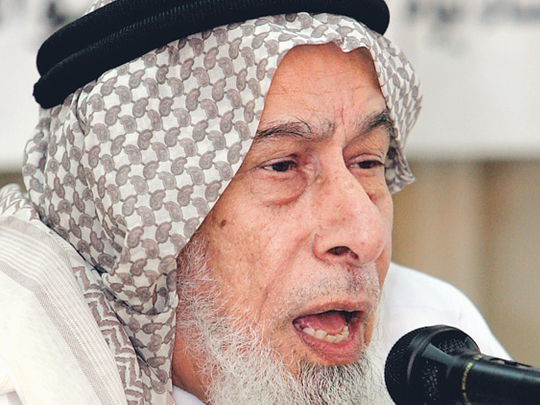
Dubai: Renowned Islamic scholar Ahmad Al Kubaisi called for launching a campaign to rationalise the use of water in the UAE in line with the country's efforts to preserve natural resources.
"Our Prophet Mohammad [PBUH] urged people not to overuse water, even during ablution [wudu] and to avoid wasting it even if they were by the side of a river," Al Kubaisi said.
The call was made during a Ramadan seminar titled Islam and Environment organised by the Emirates Environmental Group on Saturday.
"Ramadan is the month of love. The love of God, of people, and of the Earth and all creatures," Dr Habiba Al Marashi, Chairperson of the group, said.
"However, we must translate this love into action through our daily behaviour, and this is what we aim to achieve through our first Ramadan seminar on the environment," she added.
Dr Mohammad Abdul Raouf, Director of the Environment Research section at the Gulf Research Centre, highlighted the strong link between environment and economy, which is reflected by laws and legislations.
The UN is considering changing the concept of Sustainable Development to make environment the basis of human life, which will be discussed during the UN conference in February, 2011, Abdul Raouf said.
Dr Hassan Hassoun, Professor of Environment Science at Dubai University, said man is just one out of 10 million creatures that inhabit the Earth, all of which complement his life.
"The increase in population required development in infrastructure, services and all other aspects related to human life. This in turn requires using the planet's exhaustible sources such as raw material, which must be regulated," Hassoun said.
"We must give all creatures a chance to live on the Earth, which we control, especially as the high increase in the planet's population, which is expected to reach nine billion by 2050, results in a high degree of pollution," he added.
The Earth was mentioned 88 times in the Quran, which reflects the great importance of the environment in Islam, according to Dr Al Kubaisi.
"We all know the horrors of doomsday, yet Prophet Mohammad [PBUH] said: ‘If any of you have a date sapling on doomsday, he should plant it,' which highlights the importance of environment," Al Kubaisi said.
"The Prophet cursed anyone who muddies a water stream, while he said that he saw a man in the highest ranks of paradise because he removed a thorn from the road," he added.
Since man shares the Earth with other creatures, Islam calls on people to respect these creatures and promises those who do with forgiveness and salvation, Al Kubaisi said.
"All people make mistakes, but a Hadeeth by the Prophet says that a prostitute had been forgiven because she gave a thirsty dog some water," he said.
"The woman saw a thirsty dog in the desert, and she went down a well to get him some water, which she brought out of the well in her shoe because she had no other container. To climb out of the well, she had to hold the water-filled shoe in her mouth, and her act was greatly rewarded by God," he said.
"Another worshipping woman was doomed because she held a cat in her house and failed to feed it until it died, which shows that performing religious duties does not mean salvation if not accompanied by protecting life and the environment," he said.












